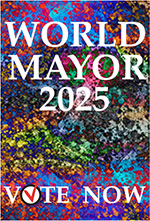
FRONT PAGE
About World Mayor
City Mayors Foundation
Email
worldmayor@gmail.com
Tel: +44 20 8439 7978
 
WORLD MAYOR 2018
• VOTE NOW
• Shortlist 2018
• Longlist 2018
• Raison d'être
• World Mayor history
• World Mayor Prize
• Code of Ethics
• Criteria
• Meet the Press
WORLD MAYOR 2016
• Results 2016
• Project 2016
• Shortlist 2016
• Longlist 2016
• Code of Ethics
• World Mayor Prize
• World Mayor History
• Raison d'être
INTERVIEWS WITH
• Mayor of Athens
• Mayor of Lahr
• Mayor of Mechelen
TESTIMONIALS
• Mayor of Aleppo
• Mayor of Amstelveen
• Mayor of Athens
• Mayor of Cologne
• Mayor of Gdansk
• Mayor of Grande-Synthe
• Mayor of Hettstedt
• Mayor of Lahr
• Mayor of Lampedusa
• Mayor of Lesbos
• Mayor of Mechelen
• Mayor of Philadelphia
• Mayor of Schwäbisch Gmünd
ESSAYS BY
• Mayor of Aleppo
• Mayor of Amstelveen
• Mayor of Athens
• Mayor of Gdansk
• Mayor of Lahr
• Mayor of Mechelen
• Mayor of Schwäbisch Gmünd
PROFILES OF
• Mayor of Amstelveen
• Mayor of Athens
• Mayor of Cologne
• Mayor of Gdansk
• Mayor of Grande-Synthe
• Mayor of Lahr
• Mayor of Lampedusa
• Mayor of Lesbos
• Mayor of Mechelen
• Mayor of Schwäbisch Gmünd
WORLD MAYOR 2014
WORLD MAYOR 2012
WORLD MAYOR 2010
WORLD MAYOR 2008
WORLD MAYOR 2006
WORLD MAYOR 2005
WORLD MAYOR 2004
|
|
Richard Arnold
Mayor of Schwäbisch Gmünd, Germany
Awarded fifth place in World Mayor 2016
14 February 2017: Richard Arnold has been Mayor of Schwäbisch Gmünd (population 60,000) since 2009. He was one of the first German mayors who thought longterm about the integration of immigrants. Years before the summer of 2015, when Germany allowed hundreds of thousands of Syrian refugees and displaced people from other disaster-torn regions into the country, the Schwäbisch Gmünd Mayor offered a strategy and practical measures to allow refugees and immigrants to become part of the local community. For example, he thought it absurd to house large numbers of newly arrived refugees in converted industrial buildings and force them to idleness. Instead, Mayor Arnold believes one should start with the premise that “all asylum seekers and refugees are to become an integral part of the community”.
Richard Arnold was born in 1959 in Schwäbisch Gmünd, a city of some 60,000 people, 50km east of Stuttgart and, following his education at a local high school, studied public administration at the universities of Konstanz and Frankfurt. After a scholarship year at one of America’s elite universities, the Massachusetts Institute of Technology“ (MIT) in 1988, Arnold worked for two years at the Centre for European Policy Studies in Brussels as expert on EU agricultural and environmental policies. Before returning to Brussels in 2000, he occupied several senior posts with the state government of Baden-Württemberg in Stuttgart.
During his years outside Germany, Richard Arnold embraced globalisation - he speaks German, English, French, Dutch and Spanish - but also learnt that in an increasingly mobile, outward-orientated society, the role of the local community was more important than ever.
In his essay for World Mayor, the Mayor of Schwäbisch Gmünd quotes the Austrian writer Ernst Ferstl: “People say: There are too many refugees. - Refugees say: There are too few good people.” The Mayor continues to describe how his city treated refugees straight after their arrival as an integral part of civic society. He calls is the ‘Schwäbisch Gmünd Way’.
Extract from Mayor Arnold’s essay:
The “Schwäbisch Gmünd Way” starts out from the premise that all asylum seekers and refugees are to become an integral part of the whole community. In doing this, following the Christian ideal is vital, according to which the individual and his or her abilities and talents must be at the core of all our endeavours.
Right from the start, refugees in Schwäbisch Gmünd are consistently supported and integrated into community life in accordance with a specific plan. We, as a community, see this support as an integral element of a life in dignity, especially in a new environment. Our concept offers a five-step-plan of orientation, combining individual support with certain demands.
At first, all newly arrived refugees are given the opportunity to make new acquaintances at a ‘welcome reception’ held as soon as possible after their arrival. ‘Welcome guides’, volunteers or employees of the city, present the city's “welcome culture”. On the next step, the refugees attend language courses in accordance with their individual skills, which is key for access to the local community. MORE
Typical tribute:
We can summarise Mayor Richard Arnold’s mission with four words: Passion, Empathy, Togetherness, and Determination. These four elements accompanied by his charismatic personality generated a positive flow within the citizenry. Since the beginning of his mandate, the city has been flourishing in several fields, e.g. cultural, social, and architectonic among others. The special bond he created with his citizens resulted in a broad support for a rapid integration of the refugees into the urban life. In addition to German language courses and decentralized accommodation, he managed to provide an immediate and active participation of the newly arrived to the city life, while waiting for the residence permit. To synthesize the form of asylum policy undertook by Mr. Arnold, the German media created and used the expression ‘Gmünder Weg’. We hope that Germany and Europe will soon succeed to emulate Mr. Richard Arnold translating the ‘Gmünder Weg’ into a ‘European Way’. MORE
Further reading
TRIBUTES | ESSAY
|



